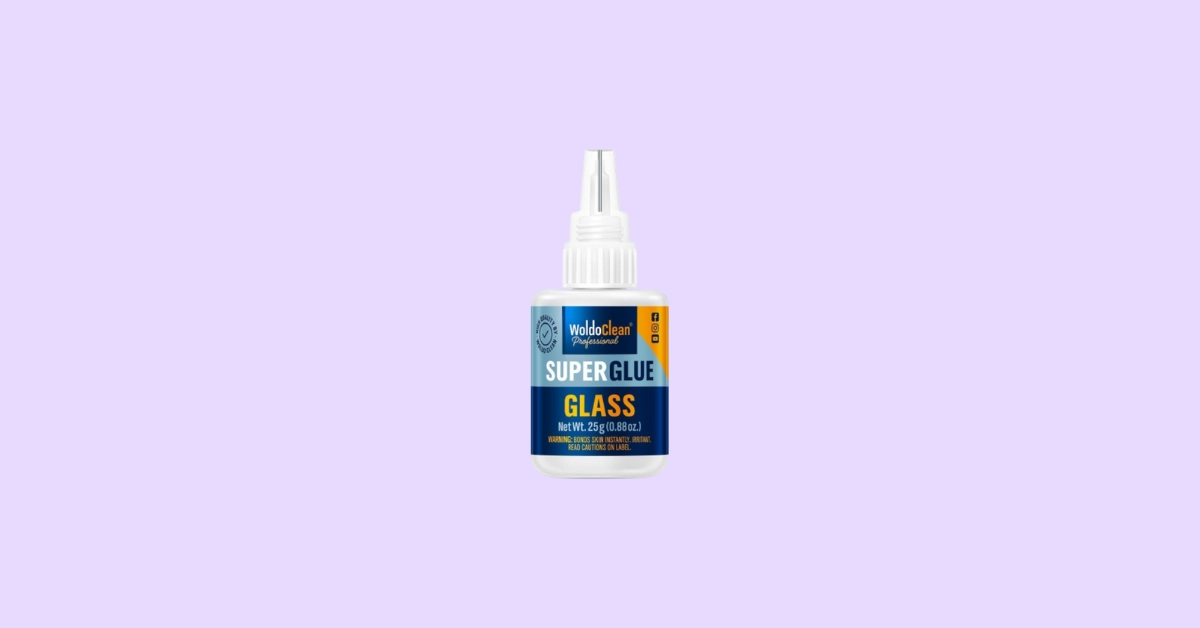Not all adhesives are made for glass, and choosing the wrong one can ruin your project, especially if it turns yellow and affects the look.
That’s why finding the right glue is so important. The suitable adhesive will bond glass effectively without compromising its appearance.
I’ve put together a list of adhesives that work great for glass. So, if you’re wondering which one to use, keep reading to find the perfect match for your project.
What’s the Best Glue for Glass?
Choosing the best glue for glass depends on the type of glass, your environment, and your project. You need something waterproof, weatherproof, and UV-resistant that does not turn yellow.
So, I recommend a clear-drying adhesive such as silicone for transparent or decorative glass. You can also choose UV-cured glue for outdoor glasses. In heavy-duty or tempered glass applications, epoxy provides excellent strength and durability.
Moreover, regarding the types of adhesives, you can choose either hot-melt or non-hot-melt glue for glass. Hot melt adhesives are easy to use, but their moderate strength is better for temporary or decorative uses.
Weather-resistant and flexible adhesives like silicone and polyurethane are ideal in outdoor environments.
Types of Adhesive that Stick to Glass
Epoxy Adhesive
The epoxy adhesive works with nearly every material, including glasses. It is a two-component adhesive that mixes and creates a transparent substance.
They undergo a chemical reaction and form a rigid and solid bond. Epoxy is always ideal for precise application because it does not expand during curing. Some epoxy can turn yellow if the surface is not prepared properly.
Epoxy offers exceptional durability for structural or heavy-duty glass repairs, such as fixing glass tables or bonding glass to metal. It is also highly resistant to water and weather, perfect for outdoor activities. One disadvantage of epoxy adhesive on glass is that it will turn slightly yellow under UV exposure.
Silicone Adhesive
Silicone adhesive is a liquid that acts like gel. It can be applied using hand-held caulking tools, commercial-grade extrusion devices, and heavy-duty or crafting glue guns.
It is a flexible, rubbery material that bonds well to glass and other surfaces. Since glass does not shrink or expand like wood or metal, silicone adhesive can easily bond glass. Silicone remains elastic after curing, resisting cracking even if the material expands.
You can find silicone adhesive in clear, white, or other colors. It is excellent for sealing and bonding in aquariums, windows, and outdoor applications. Because it resists water, weather, and UV rays, silicone is ideal for applications requiring a waterproof and weatherproof bond, especially in construction and outdoor settings.
Hot Glue Gun and Glue Stick
Hot glue sticks are best for temporary fixes in glasses. They reduce mess, such as strings and trails. Moreover, hot glue works well in small spaces and is often used for woodworking, packaging, and installing things in bathrooms and kitchens.
They don’t expand during application and are available in clear or translucent forms and various decorative colors. While hot glue provides moderate durability, it is unsuitable for heavy-duty or high-temperature applications.
Their water and weather-resistant properties are limited, and they have poor UV resistance, degrading in sunlight over time. Hot glue is best for quick, easy-to-use bonding in crafts, decorations, or temporary glass projects.
Superglue or Cyanoacrylate
Superglue and cyanoacrylate are the same thing. It is a fast-acting adhesive that bonds quickly when exposed to moisture in the air.
Superglue comes in different types, so it works for many tasks. It can set in seconds for quick jobs or take a few minutes if you need more time to adjust during careful installations.
While durable, the bond can be brittle and unsuitable for joints subject to stress or vibration. Superglue offers limited resistance to water and weather and may yellow under prolonged UV exposure. It is ideal for quick fixes, such as repairing cracks or attaching small glass components, but not for heavy-duty or outdoor applications.
Polymar Glass Glue
You can also choose polymer glass glue, specifically made to bond glasses. It forms a stable, flexible bond with minimal expansion.
This makes polymer glue suitable for precision applications. The adhesive is usually transparent or translucent, providing a clean finish for decorative or intricate glasswork. It is highly durable, resisting impacts and vibrations, and has good water, weather, and UV resistance.
Polymer glass glue is best used for bonding glass in challenging conditions or for projects where a clear, strong finish is essential.
Structural Acrylic Adhesive
If you want a glass adhesive for load-bearing applications, you should choose structural acrylic adhesives. These adhesives have low expansion and maintain a rigid hold under stress, making them ideal for these applications.
Structural acrylic adhesives are two-part adhesives that cure rapidly to form a strong, durable bond. They are typically opaque or slightly yellowish and are exceptionally durable.
You will see them used in industrial or structural settings. Structural acrylic adhesives provide good resistance to water and weather, though UV resistance varies with the product. They are best suited for heavy-duty applications, such as construction projects or industrial glass bonding to metal.
Polyurethane Adhesive
Polyurethane adhesive forms bonds by reacting with moisture. They are strong and flexible. Polyurethane expands slightly during curing, which helps fill gaps and create a tight seal. These adhesives are usually dry opaque and in colors like white, tan, or grey, and they are highly durable.
Polyurethane adhesives maintain their bond under stress or environmental changes. They are suitable for outdoor projects, as they offer superior resistance to water, weather, and often UV rays. Moreover, they can seal and bond glass applications in challenging environments, such as automotive repairs or outdoor construction.
Editor’s Opinion
Finding the perfect glass adhesive is like picking the right tool for the job—it can make or break your project. If you need unshakable strength, epoxy is the heavyweight champ.
But silicone is your go-to if you want something that flexes with the weather. For quick, on-the-spot fixes, super glue is the answer (but don’t expect miracles under stress).
For pros, polymer glass glue and structural acrylic adhesives deliver precision and toughness, while polyurethane easily tackles outdoor challenges.


